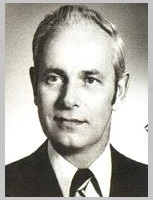|
In memory of those who have Crossed the Bar
ROY, Donald Kean - was born in Montreal on Jan. 24,1924, in the house his father built on Mount Royal Street. As a child, he took pony rides through the unoccupied greenery of the Mount Royal Cemetery, which was effectively his backyard. Donald’s father, John Roy, and his grandfather Francis both managed the cemetery, and as he got older, young Donald trimmed, mowed and hedged his way through its 185 acres overlooking the city.
Fie attended Guy Drummond elementary school, and later Strathcona High School, where he took an interest in agriculture and science. In February, 1939, he attended a sleigh ride party at his uncle William Ormiston’s house; Anne Roy, a cousin, invited Marion Henry. Marion thought Donald was handsome and reserved, with a streak of humour that intrigued her. Donald thought Marion was the most beautiful thing he’d ever seen in a winter sleigh. In 1941, shortly before he shipped off to the war, the pair was engaged.
By age 19, Donald was serving as a gunnery officer of the HMCS BAYFIELD, a Bangor class minesweeper that cruised the English Channel. He became known as “two beer Roy,” after his crew figured out that this was all it took.
Late in the war, the ship took as prisoners several German sailors adrift in a lifeboat, which posed a problem for Donald and the Bayfield crew: the ship had no brig. So they were locked in the latrines. Once ashore, Donald watched the Germans being marched, blindfolded, off the ship. The enemy seemed a slight more human that day: Donald remembered one German sailor who was so nervous he nearly fell off the gangplank.
Donald returned to Montreal in 1945, moving into the residences of Macdonald College on the West Island with his wife-to-be. Built for returning veterans, these residences quickly became known as ‘Diaper Dell’ for the abundant number of babies being produced there. Donald and Marion, though, wouldn’t contribute to the boom until 1950, three years after they married, with a daughter, Lynn.
After getting his degree in agriculture, Donald moved to Moncton, where he sold insecticide for Sherwin-Williams. It was here he learned the delicate art of the soft sell. “Donald and his boss learned that you talked to a customer for half an hour before business,” says Marion. “You never pushed.” For Donald, who delighted in talking to anyone and everyone, it was a perfect job.
In 1967, John Roy retired as the manager at Mount Royal Cemetery. His cousin, Wallace Roy, took over, and Donald became assistant manager and finally manager two years later, when Wallace retired. Selling plots was secondary to him, as he always figured he worked for the people who were buried there. He was meticulous in keeping up the cemetery; anything less would be an affront to his customers.
Donald inherited his mother’s reserve and his father’s outlandishness. On the one hand, he was staid and conservative—a stickler for detail who instructed his children to work hard, play fair and keep their hands off the walls, so as not to scuff the paint. His sense of humour, though, got the best of him, and he talked in absurd-sounding acronyms. “PBL” (“pure bloody luck”) was a favourite on the curling rink; Andrew, his youngest son, remembers Donald muttering “UYK” after being taken in by one of his jokes. It took Andrew a while to figure out that stood for “up your kilt.”
The 1979 expansion of the cemetery was galling to Quebec nationalists, who suggested it was the ultimate example of Anglo privilege. Even in death, they said, English Protestants lorded over the city. To Donald, this was an affront-similar to Quebec’s new language laws, which he felt erased the city’s history.
He retired in 1991 at 65 because, as Marion says, “He felt it was the right thing to do.” The abundance of free time meant much larger gardens—Donald had an affinity for roses; Marion, for picking them-and more time at the Royal Montreal Curling Club. He devoted his Mondays to the St. Andrew and St. Paul Church chapter of Meals on Wheels. In 2002, he received the Queen’s Jubilee Medal for the promotion of Canada’s Scottish heritage.
He suffered a heart attack on June 30,2005. Though he recovered, he couldn’t seem to get his strength back and was soon diagnosed with non-Hodgkin’s lymphoma. “He was willing to try any treatment they were going to give him,” says his son, Glenn, an actor. “But nothing worked. They had nothing else to give him.”
He died in his sleep on July 15, at 82, after giving his sons specific instructions about his funeral. He was to be cremated. It would save space in the cemetery he loved. (McLean's Magazine, Aug 2006)
Ships served in:
|

